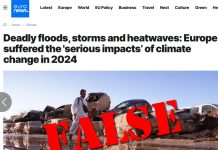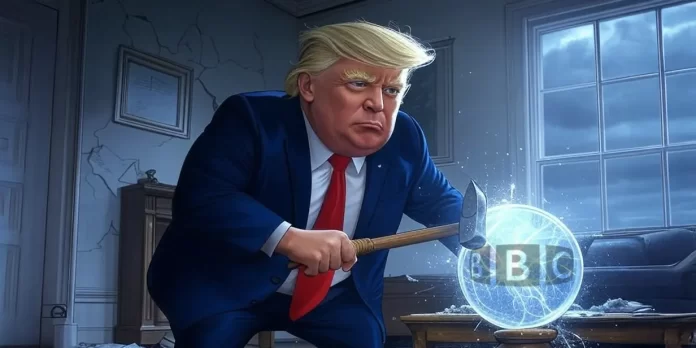Guest essay by Charles Rotter – originally published on Watts Up With That?
Six weeks ago, the BBC’s climate soothsayers were gazing into 2025 with their trademark blend of gloom and green idealism. Their January 7 piece, “From Trump to a ‘Game-Changing’ Lawsuit: Seven Big Climate and Nature Moments Coming in 2025,” sketched a year of UN lawsuits, lofty CO2 targets, and global summits—all set to “shift the dial” on warming. They gave Trump’s return a nervous glance, hinting his Paris exit might “hinder climate action,” but banked on technocrats and NGOs to keep the faith. Then the Trump juggernaut roared in, flattening their predictions in under two months. Now, with NGOs in the crosshairs, the rubble’s still smoking. What a difference six weeks make.
However, some experts say momentum is now on the side of the energy transition despite any actions Trump will take. “The result from this election will be seen as a major blow to global climate action,” Christiana Figueres, the former UN climate chief, told the BBC in November. “But it cannot and will not halt the changes under way to decarbonise the economy and meet the goals of the Paris Agreement.”
Global economics have changed significantly since Trump was last president, says Stientje van Veldhoven, regional director for Europe at the World Resources Institute (WRI), a non-profit based in Washington DC, and former environment minister of the Netherlands. “Whereas eight years ago, the economics worked against [the clean energy transition], now they very much start to work in favour of it. That is one thing that has really changed.”
Step one: the BBC’s pre-election bubble. In early January, they listed seven “big moments” for 2025—Trump’s term as a minor snag, followed by a UN climate court case, G20 greenwashing rules, UK CO2 cuts, Brazil’s COP 30, Arctic talks, and some tech fluff. They hedged on Trump, clinging to China’s renewable hype and Biden’s Inflation Reduction Act (IRA) as lifelines. NGOs, those tireless peddlers of climate dogma, lurked in the background, funded by agencies like USAID to amplify the narrative. The BBC figured the machine would chug along, Trump or not.
Step two: Trump swings the axe. By January 20, 2025, Inauguration Day ink still wet, Trump unleashed chaos. He re-ditched the Paris Agreement, declared an “energy emergency” to greenlight oil and gas, paused offshore wind, and froze IRA funds. But the real kicker? He’s targeting the NGO pipeline. Word’s out that Trump’s team is slashing climate propaganda budgets, especially to those previously depended on the now defunct USAID, which had funneled millions to groups preaching doom and pushing renewables. The BBC’s mild worry about “hindered action” didn’t foresee this bulldozer tearing up the roots.
Step three: AR7 talks collapse. Last week, the U.S. bolted from the IPCC’s Seventh Assessment Report (AR7) negotiations—a body blow to the climate science cartel. The BBC had pinned hopes on AR7’s 2028 release to keep the pressure on, but Trump’s crew smelled more alarmist tripe and walked away. Without U.S. cash and clout, the IPCC’s scrambling. NGOs that lean on these reports for fundraising? They’re sweating now, with USAID’s spigot gone.
Step four: NGOs take the hit. Here’s where it gets juicy. USAID and similar agencies have long been ATMs for NGOs—think Greenpeace, WWF, or lesser-known outfits lobbying for net-zero. Trump’s killing that gravy train, redirecting funds to energy independence over climate sermons. The BBC’s “big moments” relied on these groups to grease the wheels—lobbying for that UN lawsuit, hyping COP 30, guilt-tripping G20 stragglers. Without U.S. dollars, their megaphone’s muted. The impact’s seismic; propaganda doesn’t run on fumes.
Step five: global plans crumble. The UN climate lawsuit? Dead in the water if Trump tells the International Court of Justice to shove it—and he will.
Expected in early 2025, the ICJ ruling would be non-binding but could be cited in climate court cases around the world.
“Although non-binding, ICJ advisory opinions carry significant moral and legal weight,” says Setzer. “This advisory opinion has the potential to establish a global benchmark for climate accountability and reinforce the connection between human rights, sustainability, and environmental protection.”
The UK’s 81% CO2 cut by 2035? A quixotic quest when America’s drilling, not decarbonizing. Brazil’s COP 30? A tropical talk shop without U.S. heft or NGO hype. The G20’s greenwashing crackdown? Toothless when the world’s second-biggest emitter opts for coal and crude. The BBC didn’t game out a Trump who’d choke the NGOs keeping this circus afloat.
Step six: the green dream stalls. Biden’s IRA was the BBC’s ace—billions in clean energy handouts to outlast Trump. Nope. His 90-day funding freeze is a prelude to gutting it, with cash flowing to pipelines, not windmills. Solar and wind firms are jittery, their stocks wobbling as subsidies vanish. NGOs pushing renewables as gospel? They’re scrambling for new sugar daddies as the checks bounce. The BBC’s January vision didn’t account for a Trump who’d kneecap the whole ecosystem—propaganda and all.
This is a front-row seat to a rout. Six weeks ago, the BBC thought 2025 was set for climate crusaders—lawsuits flexing muscle, summits preaching unity, NGOs amplifying the panic. They didn’t see Trump’s juggernaut coming, least of all his aim at the NGO cash cow. From Paris to AR7, from USAID to COP 30, he’s not just slowing the train—he’s dynamiting the tracks and torching the wreckage. The BBC’s crystal ball? Smashed. The view of the debris? Priceless.




















Total propaganda is being inoculated with the truth! Truth has a way to make reality and facts become more important than agendas and false narratives! Trump has exposed the hypocrisy and deception and lies better than anyone plus all the elitist nonsense that the globalist politicians spout off about!